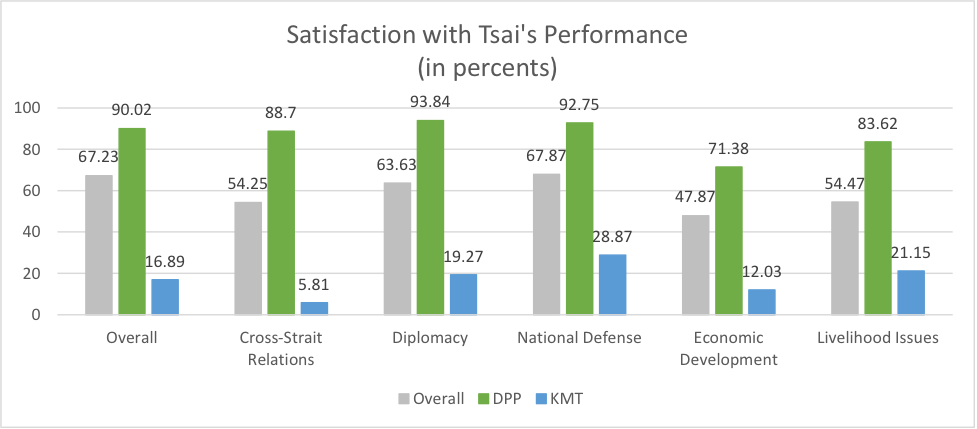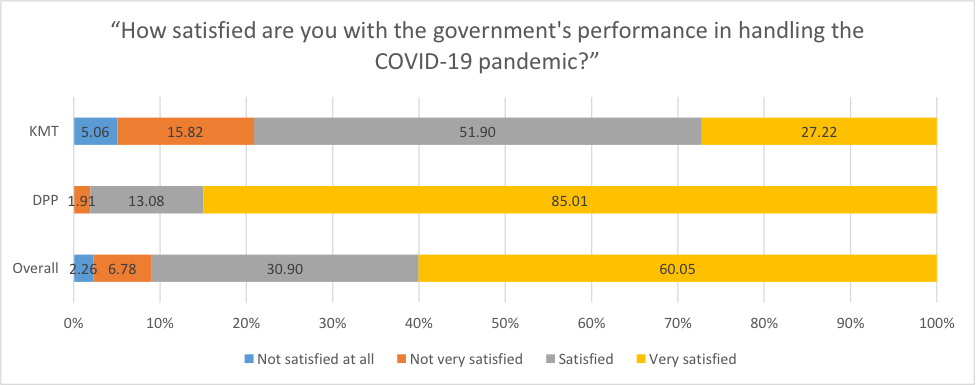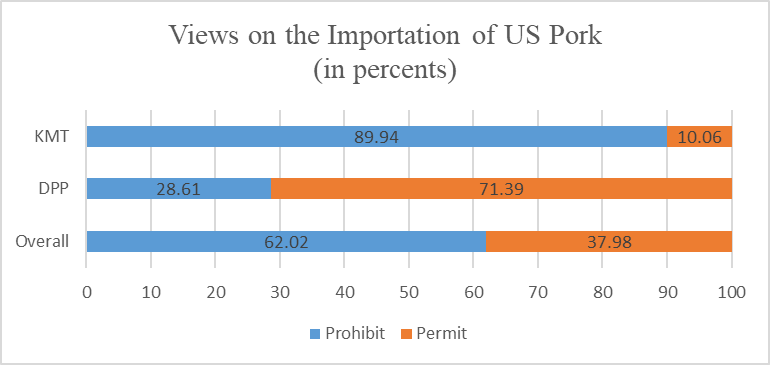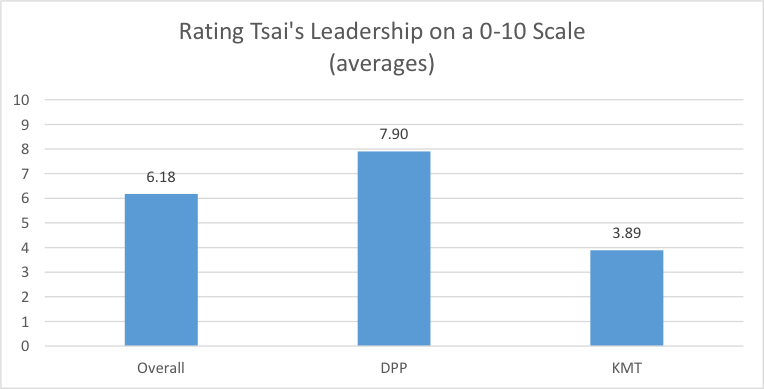A year ago, Tsai Ing-wen (蔡英文) entered 2020 with strong public approval ratings, ultimately besting Han Kuo-yu (韓國瑜) by nearly 20 percent in the January presidential election, with an approval rate that reached 68.5 percent in February 2020. While most polls continued to show Tsai with majority support throughout the year (see here and here), this analysis seeks to unpack the factors that most influence views of Tsai’s leadership a year into her successful reelection as president. For example, international attention to Tsai this year remains largely favorable, as she was named one of Time Magazine’s 100 Most Influential People of 2020 and was selected for the Financial Times’ list of influential women, in large part due to her administration’s handling of COVID-19 and its lessons for other countries. To what extent this recognition influences domestic perceptions or trumps traditional factors influencing presidential approval is less clear.
We would expect public perceptions to be shaped both by partisan lenses and by specific policy areas. Decades of research has demonstrated that those who voted for or identified with electoral winners evaluated the policies and personal character of those politicians more favorably. Moreover, supporters of electoral losers are more likely to evaluate policies and the system as a whole less favorably, even showing decreased satisfaction with democracy. Given that Tsai decisively won the popular vote in the 2020 election, it makes sense that the majority of Taiwanese citizens view her favorably, while supporters of the Kuomintang (KMT, 國民黨) and other “blue” parties would view her less favorably.
Tsai’s main domestic and international policy challenges are well-documented. The deterioration of cross-Strait relations since 2016 is unlikely to be reversed as China demands adherence to the so-called “1992 Consensus” (九二共識) a position that has little support among Tsai’s base. The potential loss of additional formal diplomatic partners since the end of the diplomatic truce, a period where neither China nor Taiwan attempted to poach diplomatic partners recognizing the other side, further incentivizes diplomatic efforts to maintain and expand both formal and informal diplomatic partnerships. Tsai must also contend with China’s growing military assertiveness in the Taiwan Strait and South China Sea (see here and here), as well as concerns about Taiwan’s defensive capabilities (see here and here). Finally, domestic concerns about economic growth and restructuring, in addition to broader livelihood issues such as social welfare programs, remain key challenges despite efforts in Tsai’s first term.
In addition, concerns over the import of US pork have divided the public. In August of 2020, Tsai announced a policy change starting January 1, which would allow the import of US pork containing the additive ractopamine, a drug used to grow leaner and larger animals that is banned in the European Union and elsewhere over safety concerns. Public opinion surveys in Taiwan find most people have generally unfavorable views of US pork imports, with a KMT-affiliated think tank finding that 63.4 percent of Taiwanese citizens believed the government would be unable to effectively test ractopamine levels. Proponents see the change as a means to improve US-Taiwan relations and potentially lead to a much-desired US-Taiwan free trade agreement, as the import ban was repeatedly brought up in discussions between US and Taiwanese negotiators. Meanwhile, KMT legislators protested the decision by throwing buckets of pig guts, blowing whistles, and sounding air horns in the Legislative Yuan, which ended in a physical brawl between legislators. Many Taiwanese citizens, particularly those living in the south where domestic pork is produced, were outraged by the decision, with divisions erupting even among families. Subsequently, the Taiwanese Council of Agriculture allowed businesses to label their pork “Taiwanese Pork” as a means to differentiate, yet mislabeled foreign pork has already generated controversy.
To address perceptions of Tsai, we analyzed newly released individual-level survey data from National Chengchi University’s Taiwan’s Election and Democratization Study (TEDS2020_PA09), which involved a sample of 1,214 Taiwanese respondents surveyed in September 2020. We analyzed overall satisfaction with Tsai’s performance since her 2020 inauguration, as well as with her performance in several traditional policy areas: cross-Strait relations, diplomacy, national defense, economic development, and livelihood issues. The figure below shows the percentage of respondents who stated they were satisfied or very satisfied in each area, with separate breakdowns for supporters of the Tsai’s Democratic Progressive Party (DPP, 民進黨) and the main opposition KMT.
Several patterns emerge. First, a majority of respondents were satisfied with Tsai’s overall performance (67.23 percent) and in all specific areas other than economic development, in which 47.87 percent expressed satisfaction. Secondly, as expected, we saw the influence of party identification on evaluation of Tsai, with DPP supporters far more satisfied than KMT supporters. The largest divergence could be found on cross-Strait relations, an area where 54.25 percent of respondents overall were satisfied, but where 88.7 percent of DPP supporters and only 5.81 percent of KMT supporters shared such sentiment. Meanwhile, we found the smallest divergence on economic development, though a considerable gap remained (71.38 percent vs. 12.03 percent, respectively). The survey also identified that 26.31 percent of respondents believed that cross-Strait relations should be Tsai’s top priority—other than COVID—with only economic development mentioned more (36.09 percent). Perhaps unsurprisingly, those who identified cross-Strait relations as the biggest issue were largely dissatisfied with Tsai’s performance (60.70 percent), and those focusing on economic development were similarly dissatisfied (59.02 percent).
Previous studies on evaluations of Tsai’s performance employing these same metrics during her first term in 2017 found steep partisan divisions as well (see here and here). However, a few differences clearly stand out. First, among DPP supporters, overall satisfaction and satisfaction in particular policy areas all showed increases, with overall satisfaction up from the 70s in 2017. Second, among KMT supporters, rates are still relatively consistent, although satisfaction noticeably increased in national defense, economic development, and livelihood issues. Third, we consistently see that Tsai’s lowest evaluations are on economic development, both overall and among DPP supporters. Among KMT supporters, only her approach to cross-Strait relations resulted in lower rates of satisfaction. Evidently, Tsai’s economic development strategies, including establishing goals to position Taiwan as a technological leader and focus on resource distribution have failed to win over the public. However, whether this is due to disagreement with the policy itself, the follow through, or a broader expectations gap remains unclear.

Moving to evaluations of Tsai’s response to COVID-19, we found overwhelming satisfaction with government performance, with 90.95 percent satisfied or very satisfied. Yet, even here we see a clear partisan divergence, with 98.09 percent of DPP supporters satisfied, compared to 79.12 percent KMT supporters. Despite the partisan gap, the results clearly indicate that the majority of Taiwanese view the government’s COVID-19 strategy as successful. In turn, this may in part be a function of respondents not only enjoying a relatively normal life during a pandemic, but also being aware of the praise Taiwan has garnered from the international community. A cursory analysis also suggests that those who were more supportive of the government’s response to the pandemic evaluated Tsai’s performance on traditional policy areas more favorably, even after controlling for demographic and partisan factors. In other words, Tsai appears to have received a slight boost even in policy areas disconnected to COVID due to her handling of the pandemic.

Finally, the TEDS survey asked respondents to choose which option on pork imports best matched their position: “permitting these imports since promoting Taiwan-US relations should be the top priority” or “prohibiting them since ensuring food safety should be the top priority.” We found that only 37.98 percent of respondents were supportive of permitting US pork imports. Meanwhile, clear differences emerged by party identification, with 71.39 percent of DPP supporters favoring importation, while 49.94 percent of KMT supporters opposed. Surprisingly, additional analysis found no substantive difference in support between areas with versus without significant domestic pork production, suggesting the issue’s broader salience. However, due to the wording of the questions, we should be cautious in interpreting these findings, as respondents may be reacting more to views of US-Taiwan relations or food security rather than the specifics of US pork imports.

Based on these preliminary findings, we wanted to see which factors—the traditional policy areas or the two challenges of 2020, COVID and pork imports—most influenced views of Tsai’s overall performance. To this end, regression analysis provided additional insight. We used overall satisfaction as our dependent variable and the specific policies as independent variables to identify whether certain policies influenced overall evaluations more than others. We found that satisfaction with each policy and supporting imports positively correspond with evaluations of Tsai, but that views on cross-Strait relations, defense, and livelihood issues had the largest substantive boost in evaluations. This pattern endured even after controlling for demographic factors (age, gender, education) and partisan identification.
The TEDS survey also asked respondents to evaluate Tsai in terms of overall leadership on a 0-10 scale. Overall, we found that Tsai was given an overall positive evaluation, with an average rating of 6.18, with a clear divergence between DPP supporters (7.90) and KMT supporters (3.89). We ran similar regressions on this measure to see which policies influenced Tsai’s score. Here, we again found that satisfaction with the traditional policies and with COVID policies lead to a statistically significant boost in Tsai’s score. We also found that the issue with the largest substantive effect was satisfaction regarding livelihood issues as well as Taiwan’s COVID policy. However, position on pork imports failed to reach statistical significance, even after controlling for demographic and partisan factors.

Overall, the results of the survey suggest that perceptions of Tsai remain highly variable based on party affiliation, which is consistent with public opinion data on democratic leaders around the world. It also suggests that despite the unique challenges of 2020, traditional policy areas remain salient. These partisan divisions on traditional policy areas may not matter all that much electorally, not only due to term limits but also due to demographic shifts that have favored the DPP and other “green” parties. Even the pork import issue may have limited long-term saliency on its own, as many Taiwanese prefer fresh pork and thus may have little interest in US pork imports anyway. However, our results also highlight issue areas that could become more problematic for Tsai and the DPP in the future, namely cross-Strait relations, livelihood issues, and economic development. This will be especially true if opposition parties can connect contemporary issues to these broader concerns. For example, the KMT’s interest in a referendum on pork imports is consistent with their previous success in tapping into opposition to same-sex marriage, and the success of tying the party to non-binding anti-LGBT referenda in local elections in 2018. Polling data directly linking Tsai’s approval rates and pork imports remain scarce, with recent polls finding slightly lower approval rates (e.g., 48 percent, 52.8 percent, and 48.4 percent), yet still outperforming her predecessors in their second term. Nevertheless, our analysis finds generally favorable evaluations of Tsai’s policies across multiple policy dimensions, which likely explains her continued overall approval.
The main point: Despite the profound challenges of 2020, recent polling data suggest that a majority of Taiwanese citizens are satisfied with President Tsai Ing-wen’s overall performance, most notably her handling of the COVID-19 pandemic. However, persistent partisan division and growing concern over her removal of restrictions on US pork imports could threaten this approval in the future.



